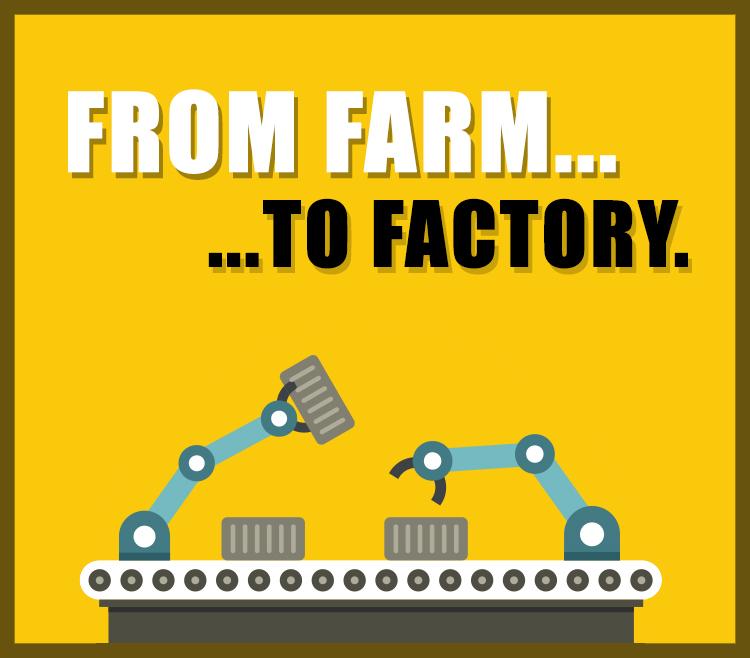As an active agent, you're already working your farm - great. The question is whether you’re getting the most you can from it. Given the same number of prospective clients in a shared market, how do you maximize your farm's output to get an edge on your competition? Short of outspending them or working 16 hour days, it's all about the systems you have in place. Let's explore how we can help you automate yourself out of a job and teach you to you operate a business.
Do You Run Your Business Like a Business?
So you're an independent contractor... you don’t work for a brokerage and you don’t get a regular paycheck or a W-2 at the end of the year. It’s important to remember that as such, you’re running your own business (don't make the mistake here of glazing that over). Most agents fail to really land that connection and even after years in the field, they'll continue to treat their business more like a hobby. Sounds funny, sure. But see if any of these look familiar...
- They work from day to day, awaiting inevitable encounters from familiar problems they don't have the time to deal with
- They have no set operational budgets (everything is on the fly and pain or opportunity-based)
- They have no established and maintained step-by-step client handling procedures
- They couldn't tell you what the day after tomorrow looks like and experience over-promised schedule snafus
In short, they never systematized the work they needed to perform at the daily level. And as a result, these agents spend more time working on individual tasks than they need to and worse, they find themselves repeatedly breaking away from these tasks in order to jump on an opportunity or to put out a fire. If you're looking for a way to tighten your processes and gain time to reign in troublesome outlier issues, then a good way to start is to develop an assembly line mentality. Don't worry... you can keep all prospect and client engagements personal... we're talking about operational processes.
How to Develop an Assembly Line Mentality
Assembly lines require consistency and so too do stable and predictable businesses. While you cannot predict which gear in your daily operation is going to get clogged next week, you can include buffer time in advance to address random issues that pop up later. This is a key to business planning... plan for what you do not know. The good news is that you're likely doing this already without even knowing it.
If you set yourself a 25-minute limit for a 30-minute webinar or call, just so that you could have 5 minutes for a Q&A session at the end... then you're already working with an assembly line mentality. Think about it, you're applying a general operational procedure ("budget for a 5 minute Q&A")... to a type of action ("for any call")... for a type of audience ("to interested leads"). In this, you're proactively setting procedures or systems in place... ahead of time.
As you develop these sorts of systems, you'll pass or fail them in practice. You'll tweak them to fit new marketing challenges, new skill sets you've picked up or staff changes to the team. And as these begin to form solid guidelines for predictable success, you'll begin to trust these systems of yours and gain a broader view of what happens further down the line... what's likely to happen next week, next month or next season.
Remember that the most efficient and predictable businesses, those that have the most flexibility to adapt to opportunities, know their operations down to a coffee lid. This level of precision predictability takes time and effort, but you can start with the Top of Funnel tasks. Here are some ideas for finding systems in your daily routine...
Create a Daily Task List
You can start just by creating a daily task list. It’s simple and will highlight any repetitive tasks that you nevertheless need to get done on a daily basis. The trick here is to list out all of the things you find yourself doing every day for your business. Then, form action groups that allow you to approach the tasks in single-sitting sessions. Here are some examples...
- Marketing: If you're like most agents, you're spending at least some portion of each day marketing your brand and services. Maybe there are leads you need to check in with, or you may be preparing a direct mail campaign or even knocking on doors. Break these into task types. For instance, the lead check-ins and direct mail campaign prep may require you to be on the phone and near your computer, whereas the door-knocking will require you to be out and about. While all three fall under more familiar business task type (aka "Marketing"), in reality, there are two task types here: those you can do in the office and those that require you to be out of the office.
- Client Service: Obviously, email is a powerful tool, but it's also an entire office in itself. Unfortunately, this is where most agents will get sucked into disarray. You can start to streamline this mess by identifying the client actions you need to take. For instance, those you need to give a status report to, any showing feedback you need to obtain or closing transactions that need your attention. Break these into response action types. You may be doing this already with filters and folders. Take another look and see if the systems you have in place match your daily routines these days. Maybe there was a shift in target clients that requires a similar shift in communication strategy or scheduling.
- Education: A business that isn't learning is likely a business that isn't growing. It's a competitive market out there and if you're not staying up on techniques that you should be doing, then at least learn what the competition working your farm is doing. So it'll be important to include some education into your routine. This probably isn’t something you’ll do every day, but certainly each week, you'll meet with your team, go over recent inquiries, regional trends, market stats and so on. This is education too... and it can be systematized. On your calendar, mark off two 30-minute blocks each week to study up on a topic (ideally with your team or peers in the office). Doesn't matter what it is, so long as it's related to your business and that you do it.
- Planning: This one is often overlooked and finds itself bleeding into the off-hours... leave time to plan your activities for the following day, because inevitably, it's going to change - it's okay, you planned for things to change. Of course, you'll want to break tomorrow's tasks into groups you can manage in one sitting, so focus on the way in which you can address them.
Start Documenting Your Business Processes
As an independent business owner, you need to do all you can to reduce repetitive, manual tasks. If you've got a team, then they'll need to know how to work within the framework of your new factory approach. Similarly... you're going to need refreshers here and there (at least until it becomes second-nature). This is where an "SOP" or Standard Operating Procedure manual (aka documentation) comes into play.
First, make sure you've got each system down pat and that you’re using any available technology to the fullest to save time and eliminate time-consuming labor. Automate tasks like lead generation which can be done more effectively using new technologies. Then, start to step-by-step document the easiest way to complete all the things on your todo list. Try to limit each task to 10, single sentence bullets.
Document everything, even the mundane things like making coffee in the morning. Your staff may not need to know how to make the coffee, but establishing your expectations on how long it should or shouldn't take, can begin to set guidelines and establish relative predictability that every person appreciates in an otherwise chaotic environment.
The more you document, the better. Start with one, simple task in a Word doc, Google doc, etc. Write down 5-10 steps to accomplish it, then name the document something like "2018 SOP - Making Coffee in 15 minutes flat" (notice the buffer... plan on delays). The key to good documentation is consistency, especially in naming, as it makes it easier for future staff to search for specific tasks. "How does the new boss like their coffee?" - there's a doc for that. Reasonably predictable? Check... next...
When you don’t need to keep all that information in your head, you’ll free up brain space and brainpower and be able to reallocate them to relationships and opportunities that will help you grow your business. Less focus on the mundane and maintain, more focus on opportunity.
Here's a Helpful Source
There’s a book called “The E-Myth Revisited” that can help you learn the difference between working on your business and working in your business. Looking to make this year rain? Who isn't? When you run your business like a business, you’ll find a new world of opportunities for success!
offrs collects and provides topical insights, statistics, reviews, humor and best practices gathered from real estate professionals and consumer homeowner industry peers. If you're a broker or agent interested in learning more about seller lead generation or automated marketing services and solutions, visit www.offrs.com or continue to browse our growing collection of industry articles at www.offrs.net.





















